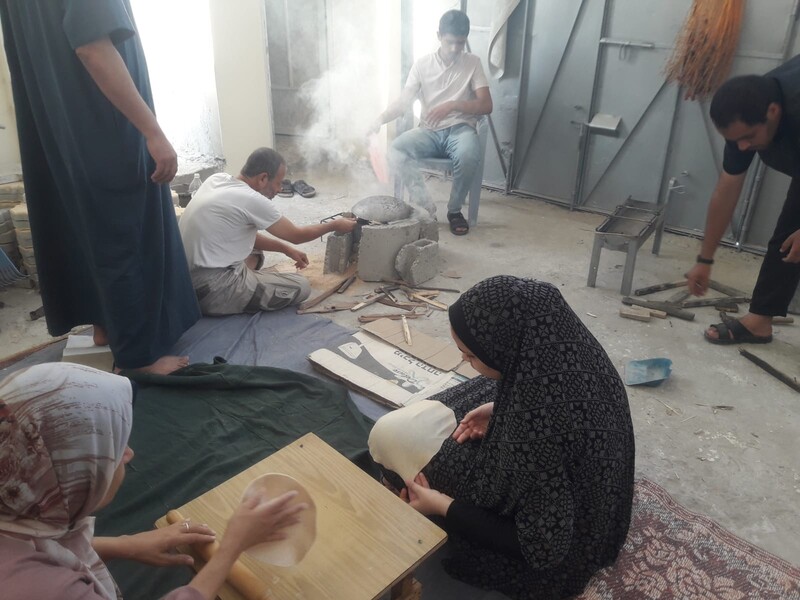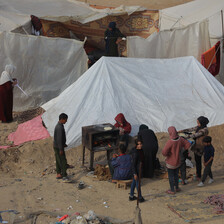The Electronic Intifada 8 November 2023

We make bread from what little supplies we have left.
The Electronic Intifada7 October
After our dawn prayers at our home in Beit Lahiya, my husband Ahmad and I heard heavy rocketfire. This was unprecedented and unusual, and it was seemingly coming from all directions.
I ran to Majd, our nine month old, who had woken up crying, and hugged him. “What’s happening?” I asked Ahmad. He said it sounded like Palestinian rockets, perhaps a response to an Israeli assassination or operation.
I had never heard such furious sounds. We looked for news but found nothing.
I opened Facebook and then other news channels on Telegram, only to find rumors that Israel had assassinated Hamas leader Saleh al-Arouri. Others said that it was Muhammad Deif, the leader of Hamas’ military wing, who was killed.
We knew nothing, but we knew it was critical.
Then, a flood of pictures and videos of Palestinian fighters in occupied Palestine. It was a shock. My mouth gaped open. I felt an incomprehensible combination of pride, joy and faith.
I felt that the liberation of Palestine is close and that I may live to witness it. Ahmad was jubilant: “I need nothing from life after living this. I don’t care if I die after seeing these pictures.”
The first time I left my home
After breakfast, we went to the home of my husband’s family. By sunset, events became more complicated, and it became obvious that Israel would embark on some kind of destructive aggression. We spent the night with them and planned to return home the next day.
By Sunday morning, 8 October, Israel had launched a war. I returned home to get some clothes and food. There was no electricity and barely any water. I tucked away my jewelry and money in my bag, along with diapers and milk for Majd.
I looked around our apartment and felt it might be the last time I saw it. Our home was more than just walls and furniture. We had worked day and night for years to furnish and renovate our home.
And, of course, the memories. It was where we loved, argued, danced, studied. Nights over dinners of fish, my husband’s favorite, watching “The Walking Dead.”
I left our home, but it didn’t leave me. My husband cried to me, “Come on, Hino! We are going for some days till the end of the aggression.”
No electricity, food or gas
There were 10 of us. My mother-in-law and sister-in-law on the first floor. On the second floor, two of my brothers-in-law and their families.
There were no markets nearby so we made bread ourselves. We washed our clothes by hand since there was no electricity. We cooked small amounts of food because we couldn’t store it in the fridge. We charged our phones at a neighbor’s home, the only one with solar panels in the neighborhood.
The Israeli attacks had taken us back in time.
My sister-in-law has a wheat allergy, so she relies on a specific diet. But with her food no longer available, she suffered. I played songs on my phone for the kids so they wouldn’t notice the sounds of bombs. This was successful during the day, but at night, the bombs shook the whole house.
On Tuesday afternoon, 10 October, I heard people shouting outside. My brother-in-law came into the house and yelled that the Israeli army had just warned a neighbor. We were worried and confused; we had heated arguments.
Some of us decided to leave the area, but I chose to stay. Nothing happened that night. The Israeli “warnings” had been rumors.
But then, on Thursday, 12 October, the Israeli planes dropped posts telling Beit Lahiya citizens to leave. Ninety percent of our neighbors left, and so did we.
It wasn’t an easy decision. I hated the idea of leaving our homes to the Israelis. But I prioritized my life because I love life, as all Palestinians do.
Moving to the house of my husband’s uncle
Majd, Ahmad and I, along with his brother and sister, went to the house of their uncle. There were 20 of us in the home.
Here we had a gas generator to pump water. Nearby was a bakery, which was later bombed. However, without an internet connection at the house, I spent three days not knowing what was happening around us. All the surrounding homes were also packed with entire families.
Since the homes are so close together and the streets are very narrow, I had trouble sleeping Friday night, 13 October.
I was kept awake by the sounds of people talking and walking. I felt as if everyone was evacuating. I opened the window and listened. Someone said a nearby house had been threatened and that we should leave now. Another said to wait a minute, that they needed to wake the kids up.
Many families were leaving. Disheveled mothers carried sleeping kids, and frightened fathers carried mattresses and bags.
People were leaving their homes in a hurry.
Return to Beit Lahiya
On Saturday morning, 14 October, we returned home to Beit Lahiya.
As soon as we entered the home, the bombing started. We gathered in the hall. I hugged my baby and closed his ears. We all sat close and covered our heads and ears.
With every bomb, we heard windows breaking and shrapnel falling. My heart and body shook violently. I wondered if this was the end. I’m terrified of death. I’m not ready to die.
I read verses from the Quran for protection. My brother-in-law shouted, “We shouldn’t have come here! The house will collapse on us! I’m leaving!” My husband cried louder, “Sit down! It’s dangerous to leave now!”
I didn’t want to leave and I felt it was our end. My sister-in-law called my oldest brother-in-law to come in a car and rescue us, but their mother begged, “Don’t ask him to come. This will put his life at risk.” My baby Majd was crying and I tried to calm him.
When the bombings were less intense, we carried our bags and left the house. We waited for my brother-in-law to arrive in his car, and when he did, we threw in our bags and sat on top of each other and fled to the home of my husband’s grandmother.
Like zombies
I felt that the house was haunted.
The kids’ faces were pale and yellow, in shock. Some sat very calm and didn’t say a word. Another cried every time her mother left the room. Fathers were depressed and smoked in the hall. Mothers cried and asked questions: What do we do, my lord? Shall we leave or stay? Where to go, my lord? Help and protect us, my lord. Guide us, please
I was speechless. We moved around like zombies. Our four-floor building emptied in less than an hour. They went south, to a “safer” place. All the women and children left the house. I remained with my husband’s uncles, their sons and one aunt.
I was thinking of leaving. Shall I endure the bombing and stay at home to protect it from the Israelis? Or shall I leave and protect my life, so I can tell others about the massacres?
That night, rumors spread that there would be a ground invasion at 4 am. I couldn’t sleep that night because of the continuous bombings. I had nightmares of soldiers entering the house and killing my husband and child in front of me. I asked them to kill me first or to kill the three of us all at once. I couldn’t decide my destiny, even in my dreams.
I felt so lonely and I didn’t want to be killed.
Moving to the house of my uncle
I wanted to go to my family’s home. I didn’t care if it was safe or not, though no place is safe here. Israel has bombed hospitals, churches, mosques and schools. I just wanted to be with my family: my father, mother, sisters and brothers. Whether we lived or died, I just wanted to be with them.
In Khan Younis, the city where I was born, I went to my uncle’s house, where my family had sheltered. They had left their home in Tel al-Hawa, which Israel was bombing.
At my uncle’s house, there was food and water, some gas and a weak internet signal. (This would be luxury nowadays.)
At that time, my husband had been far from Majd and me for 21 days. He wanted to visit, but the Israeli forces have divided Gaza’s north and south. They shoot anyone they see moving. My son, looking for his father, clung on to other men.
I choose to resist
Israel is using the media to spread its fake narratives and to get more international support against Palestinians. While Israel claims it has the right to self-defense, its actions are not self-defense. It is an occupier.
Israel has killed more than 4,000 children and is targeting hospitals and schools, claiming that it is attacking Hamas. But the reality is, this is ethnic cleansing.
Israel’s stated goal of completely getting rid of Hamas is foolish. Hamas is not just its fighters – it is the idea of resisting the occupation. This is a belief that cannot be eradicated.
The news makes me sick. Every time I read or hear about families or individuals killed, I expect that we will be the next. Everyone around me looks depressed. Death haunts us night and day. I’m terrified I will lose one of my family members. I keep imagining frightening scenarios, and I cannot stop crying.
We Palestinians in Gaza love life more than people think. We have dreams. I have so many things I want to do in life: to complete my PhD, to teach, to improve as a writer and to continue in journalism.
I hope to give birth to a girl and raise her along with my son. I want to travel with my husband and enjoy a honeymoon. I want to know what it feels like to watch a movie at a cinema, to make a snowman, to go on a hike.
I want to see my baby walk for the first time, his first day of kindergarten.
Are these impossible things to ask for? A rocket can end all this in a second.
Israel attacks anyone who moves and who resists. Palestinian citizens are all targets, but I choose to resist, and I will speak up before I’m attacked.
This piece may be my last.
I was born here and so were my parents and their parents. I have no other place to live but occupied Palestine, and I won’t leave it save to paradise, God willing.
Today, I have only a little bit of water. I must use it to cook, to go to the bathroom and to shower. Tomorrow I may not find any water to drink. Today, we ate bread and some canned food. Tomorrow there may be nothing.
Hanin A. Elholy is a researcher, writer and translator based in Gaza.





